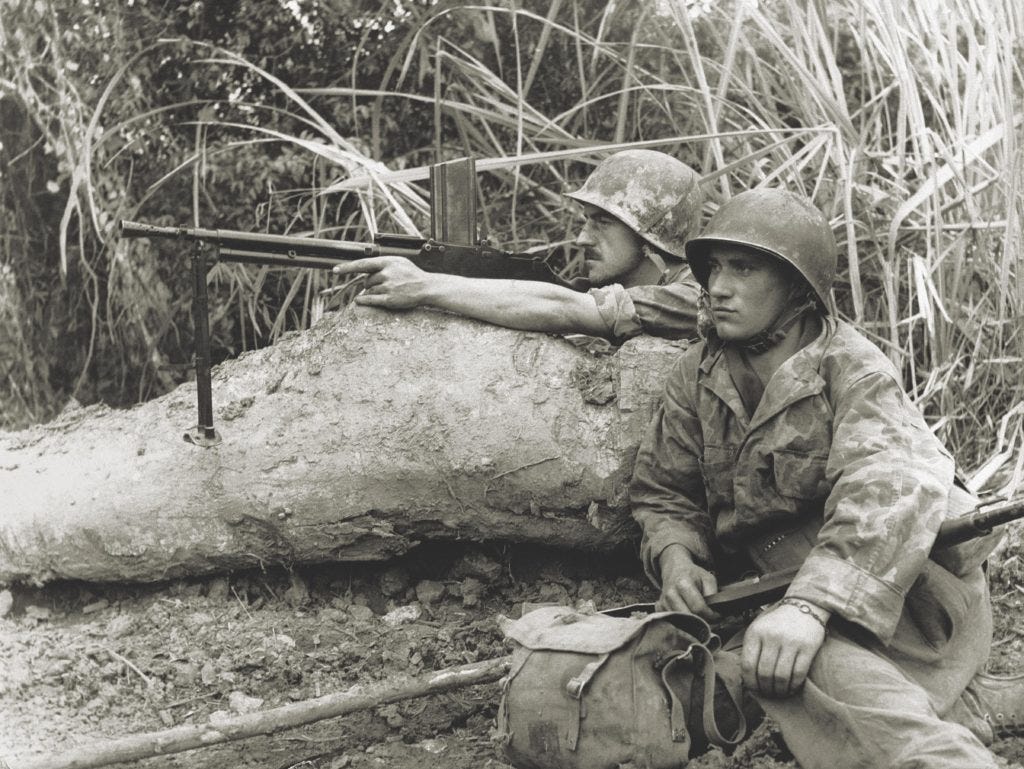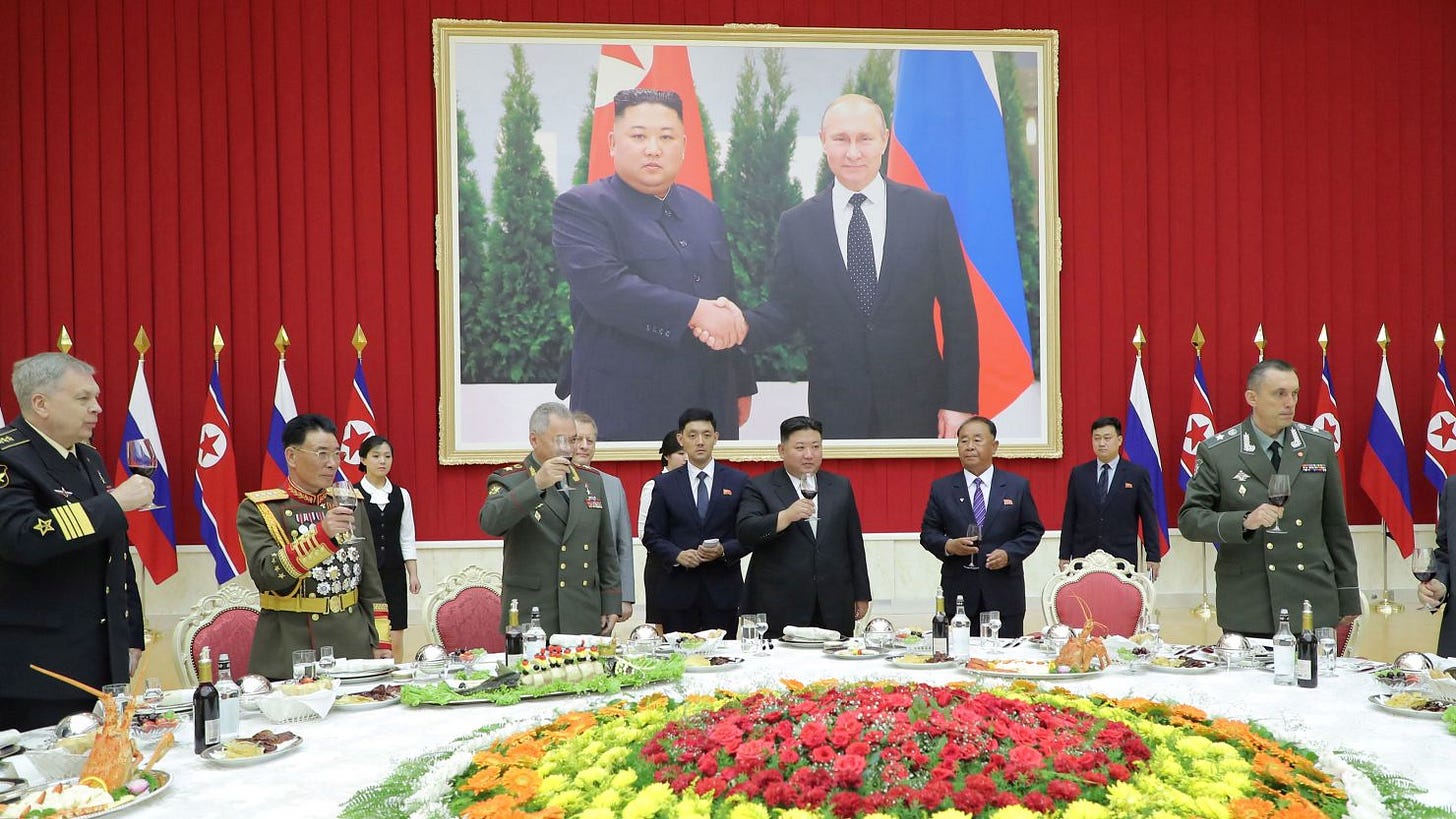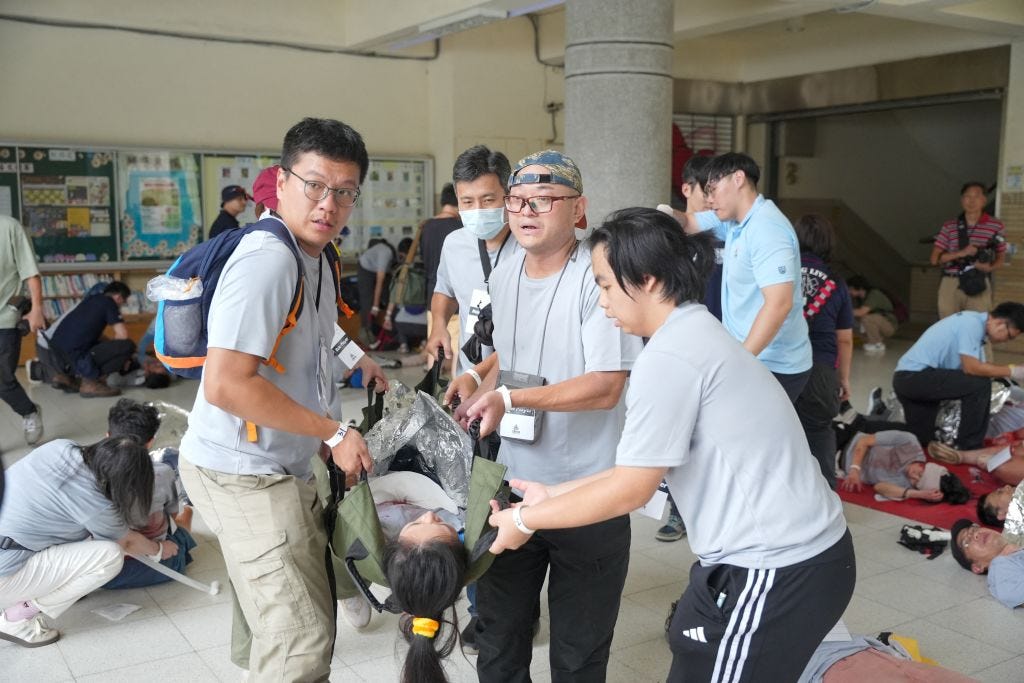There are two main arguments I wish to advance, and they are that Ukraine’s victory over Russia will allow Democracy to be on the attack finally, and that there is a strengthening of capability and resolve that can be achieved through the effort of realizing actual, material, global support. Firstly, Russia is both the second strongest of the kleptocratic regimes and the main representative of authoritarianism, with many, including Putin, leveraging Russia’s past to justify realizing a more autocratic vision of their country. If there isn't some vague moral argument about the West, then there are claims supposedly supported by Russian strength, either during the Soviet Union or now.
In order to defeat this threat, it is clear that Europe nor the US independently or even jointly could in their current incarnation actualize a battle plan and save some ad-hoc strategy during an actual invasion or attack. Much of the raw materials, new factory space, and engineers are readily available off the continent for both parties, but require real substantive negotiation and partnership in order to be reliable allies for procurement or peacekeeping. However, aside from developing the sociocultural discussion and story of liberalism there is a real ability for a global network of allied democracies, rather than the fragile states and alliances that exist currently.
In it to win it
Russia’s economy has largely slowed but has not stopped. Military recruits continue to be pulled from politically convenient locations both in and out of the country with little diplomatic pushback by really any party. Conventional military support in the way of missiles, artillery, and munitions are readily able to be restocked or smuggled by allies, with much less in the way of obstacles when it comes to production or procurement of rare materials, fuel or spare parts for equipment. This is to say nothing of the often low-tech (or sophistication) that is a feature not a bug of regular military fighting on the modern battlefield. Regular targeting of civilian infrastructure, reducing operational capacity within Ukraine, brutal war crimes to attempt to shatter will, I could go on. None of this is to say Russia is winning the war, or even could realistically, especially given Putin’s timeframe and leadership. I say all of this to demonstrate the difficult position Europe has put Ukraine in and the large problem they have been combating since the start of the war. Putin, rather than let the war purely be the only priority, has also used the ultimate goals within the war and the realities of the military as opportunities to advance agendas abroad and domestically. Civilian repression at home with children, women and men all being devised and press-ganged into various ways to service the military machine of Moscow with callous disregard. Abroad, the violence on civilians whether they be dissidents or CEOs are used to intimidate and division is stirred amongst the populace to further exacerbate division among allies. Of course, the relationship is solidified with allies whether promises have been kept or not such as with Iran since they are all marriages of convenience in Russia’s benefit as with North Korea as well. China on the other hand, has a very enviable position, with Putin as an attack dog on the West while they continue with faux-strategic ambiguity.
However, now with Russia’s economy starting to slowly burn and the American economy’s instability contributing to global instability and poor economic forecasts exacerbating problems globally, Putin is in a difficult situation. I stand by prior statements that Trump is most likely a Russian agent, even if the scant breadcrumbs he offers Ukraine is being increased from 5-6 patriot missiles or whatever paltry number, it is still woefully insufficient and unserious. And with Europe still mostly preoccupied with sighing in relief when “daddy” Trump is in a good mood and waiting with baited breath when it’s the opposite, little political courage is embodied. Even more apparent of this lack of will is the ability from heads of state to maintain a consistent moral rationale for international intervention and domestic industrial revitalization. As opposed to having the more popular war (Ukraine) Israel is often touted as the primary beneficiary. Not only is the justification for a large industrial revitalization effort weakened by being seen as intended solely for a state that is already a well armed regional power instead of the state defending against a superpower, that state in its current incarnation is not even democratic nor supportive of democracies. Hypocrisies about who and what deserves support that does not comport to the popular will denigrates political will which then compromises defense capability.

Kicking the Russian habit
A sharp pivot that relates to the broader picture which relates, promise. Often I hear much reservation about involvement in Ukraine from those who lived in or have ancestry from prior colonial states. This runs the gamut from Africa to Latin America, Asia, etc. World War II is perceived as purely a war that concerned “white” matters and there was little concern for the democratic norms or visions of many countries that interface with Europe, both then and largely now. I do not dispute most of the concerns to be truthful readers, and one would be hard pressed to. As mentioned in my prior articles (“Who is the West”) it becomes very difficult to win friends in this geopolitical climate when there is not a willingness to address the past and current injustices, especially in regard to the various parts of the world’s lived experience of the World and Cold War(s). This becomes even more apparent and becomes even more difficult (and I cannot emphasize this enough) when the states that comprise the west are increasingly lurching between liberal democracy to authoritarianism. Many of the states that made for cool locations in feel good stories about the fight against Nazism and Communism were subject to poor treatment and little regard for their perspectives during the fighting. Even worse is the repeated pattern of various different cultures and ethnic groups joining together to assist efforts surrounding democracy only to be forgotten or stereotyped, regardless of the sacrifices made. Of course, with the little knowledge (and common chauvinistic attitude) of the participating diverse fighters, whether that be GWOT or Vietnam, the true extent of the sacrifice of cultural elements, loved ones, and social belonging is never truly appreciated. Again, I could go on but I am firmly against continuing to add criticisms or ills without trying for a solution as well.

ine has itself been a victim of the whims of Europe and the US, and as a country in Eastern Europe is often viewed as perhaps not wholly but certainly distinct in large part from the traditional west. One could recall the poor treatment of Poles, Hungarians, and other citizens from that region by Western counterparts at the time and I’m sure there would be many overlaps in the experience (in part) with various other ethnic minorities who made similar moves. Naturally, the prior Soviet occupation would mean closer ties to the west, but there is little appreciation of during those same times the last gasps of colonization were being breathed in various bloody liberation conflicts. This led to close or at least regular ties to the Soviet Union and as time went on, Russia. In this time, where the democratic states are formerly controlled by fascists, colonists, or communists, there is a greater ability to recognize this shared pain and oppose neo-colonial efforts in general. Russia and China for instance are not just engaged in projects to subjugate Taiwan or Ukraine but where there are resources and geostrategic objectives like Africa and Southeast Asia. Wagner mercenaries were/are a regular blight on the African continent, offering security services that were more criminal enterprises. China on the other hand utilizing debt traps and often attracting triad criminal interest also destabilize the States that are involved.

Some may scoff at the idea of a greater net and expenditure on trying to win the information and logistical war between the democratic and autocratic world, especially given the US. I say, look no further than the Buryat who was sent to die rather than the elite in Moscow, or another African shock trooper who was coerced into fighting for his life. Russia and China’s aims could only be completed because they have a global outlook and strategy, malign as it is. Rather, it is even more important that these networks are re-established strengthened with investment and political creativity due to the higher stakes and great return for those who have limited resources. Imagine if more volunteers were able to be pulled from the wider world with a true appreciation of the stakes of Ukraine’s fight? Imagine the reduction in Russian capability if the legwork to maintain their status as a pariah was achieved? South Africa was one of the first countries to impose a true penalty that was felt by Russia and that was not being invited to BRICS due to the ICC warrant. Yet no great effort was made to capitalize on these splits and now with Trump targeting BRICS it is highly likely there could be a rally around the flag effect if not for Russia’s weakness and India and China’s relationship likely to deteriorate further.

If the Europeans are too preoccupied with whether or not they should become white ethnostates, it stands to reason that democracy can be strengthened with military partnership between unconventional but democratic partners, say like Ukraine and South Africa. Working with experienced Ukrainian operators with both tech capability and newer tactics may be just the defense partner to rid the continent of religious fundamentalist extremist, PMC groups like Wagner, and criminal enterprises. Taiwan as well could benefit from regular trade and cooperation with ports out of Johannesburg and other middle income countries that while not democracies could be encouraged can make the use out of newer trade networks. Ukraine’s anti-corruption experience and Taiwanese civil society are potent abilities within their own rights for exchanging antibodies and resources to stop and reverse democratic erosion. As mentioned in “Canada: The Overlooked Power” these sorts of collaborations and bedfellows were quite common in World War 2 and I suspect it will take no less for the coming conflicts, rather I am more annoyed this was not done already.
Lastly, given the prior issues surrounding acceptance from others before and after the war and not looking like people from other democracies or the terrible histories I am not surprised that there is a lack of investment from various communities in this war. But it relegates not only various actors in those times to a passive role both in the options at the time and the perception of one’s own significance in the effort as trivial. It is a disservice then as now for tribal considerations to comprise the bulk of what motivates moral action. Then as now many people from a variety of communities have cast their die with deadly consequence in various directions for various reasons. All that can be done is to do the right thing for the right reasons as close as you can get. And in these moments where moral principles that are substantive and weighty are on the line it is up to each individual to make the most of it to align the collective whole to a standard of virtue that can always be held with pride and most importantly lead to closer to that special place of democracy, peace, love, acceptance, and self-determination we are all aiming for.

This is why, just because I am a black American, does not mean that this is not my fight. I write this and do work to aid democratic efforts, not for Patton or McArthur but for the Harlem Hellfighters and Tuskegee Airmen, and all those who fought for the true virtue and ethics of a liberal and rational society. I don’t delude myself into thinking involvement would lead to shift to view democratic fights like those happening in Myanmar would get equal attention or effort from Europe or the US as opposed to Ukraine who are both a bit more fair in the skin as well as in the more immediate Geostrategic interests of “the West”. It is precisely because of the inequity and the parallels I see in Ukraine that I and you dear readers can recognize it as not just important but vital to foster greater understanding and correcting the mistakes made in conscious or unconscious bias. It is our time to lead our respective world, countries, communities, and selves to a better place, let's do it right and let’s do it together.








